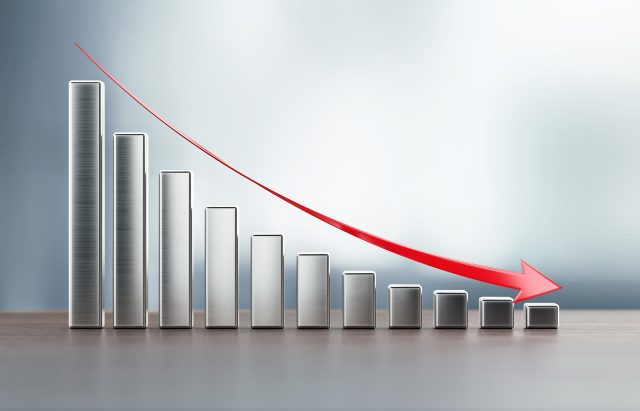Five major drinks groups see their value take a hit
By Ron EmlerIt has been a dismal few months for the kingpins of the drinks world with LVMH, Rémy Cointreau, Campari, Boston Beer, Becle and C&C Group all reporting sliding figures.

Following Boston Beer’s dismal results and 6% share slide, four further drinks groups saw their value battered last week after issuing disappointing figures.
They came in the wake of LVMH earlier this month revealing a 10% fall in sales at the Moët Hennessy wines and spirits division in the third quarter.
The most significant was Rémy Cointreau, which lowered its guidance for the remainder of its financial year and saw its shares slump by 10% to a level last seen in the early days of the pandemic shutdowns.
First-half sales fell by 22% to €636.7 million compared with last year, which was well below analysts’ expectations. Earlier this year the group had forecast a stable sales level.
Combined with the worsening backdrop in China, where Rémy leads the Cognac market, the American slowdown obliged it to cut its guidance for the full year, predicting that its 2023/24 organic sales will fall by between 15% and 20%.
After forecasting a rebound in the second half, which it said would be led by a sharp increase in US sales, it said that was now unlikely.
Contained decrease
Sales of Rémy Martin Cognacs, by far the most significant part of the company’s portfolio, fell 30.1% in the first half of the year, with the group saying it faced a “fiercely promotional” environment in North America.
Rising interest rates had also hit distributors’ financing capacity, leaving Rémy with about five months’ worth of stock in the market, about double the normal level.
Operating margins would suffer a “contained decrease”, the company said, rather than the flat outcome previously predicted. However, “Rémy Cointreau is determined to protect its 2023-24 profitability through tight cost controls,” it said.
Campari’s shares fared even worse when it issued disappointing third quarter sales figures. They plunged initially by 13% after the Italian spirits group significantly missed analysts’ expectations for third quarter sales and operating profit.
Organic sales growth of 4.4% disappointed analysts who had forecast an 8% increase on last year. Adjusted earnings before interest and tax were 11.4% lower due partly to currency movements.
The Italian group nevertheless did better in the US than some rivals who have been hit by slowing demand after the post-pandemic sales surge.
It also blamed extreme weather ranging from heatwaves and flooding this year for a subdued performance in Europe, notably in the Italian home market.
“In the medium term, we remain confident to continue delivering strong organic topline and margin expansion leveraging mix improvement as well as input cost inflation easing,” said the outgoing chief executive, Bob Kunze-Concewitz, who also told Reuters that he expected Campari to make further acquisitions to bolster its portfolio.
Analysts said the share slump was an over-reaction and that Campari’s growth was set to resume next year. The shares recovered half of the losses by the weekend.
Partner Content
Peso value
Becle, the world’s largest Tequila producer and owner of the Jose Cuervo range, had its value slashed by US$1.54 billion when the Mexican group revealed its third quarter figures.
The shares fell by 19% to early-2020 lows, giving the group one of its biggest single-day declines since the company went public more than six years ago.
The culprit was the 14% rise in the Mexican peso against the US dollar in the year to the end of September. The US is by far Becle’s main market and more than 70% of sales are made in dollars so the exchange rate swing had a huge negative effect.
When stripping out the effects of foreign exchange, annual sales should still grow by a high-single digit percentage, Becle said.
That said, peso-denominated earnings fell in all regions and categories while volumes sold outside the US also shrunk, with the group blaming economic challenges in Europe and Latin America for slowing customer spending.
Becle said it would continue to premiumise its range and said it planned capital spending in the lower range of US$200 million to US$225 million this year.
Positive signs
A positive sign was a trend toward lower prices for agave but Becle said this was unlikely to materially benefit earnings until the second half of next year.
In London, C&C Group, suffered a 5% fall in its shares following a glitch-laden software upgrade which wiped €22 million from its half year profits.
The resulting disruption to the Matthew Clark and Bibendum wholesale arms contributed to a 43% fall in operating profit to €30.5 million in the six months to August 31.
Shareholders had known about the problem back in May when David Forde stepped down as chief executive.
Patrick McMahon, who became CEO as well as finance director, said there had now been “significant progress” in restoring customer service.
Some reports had suggested that trade customers had been unable to get hold of supplies for weeks but the proportion of orders delivered on time and in full is now said to be back up to 95%.
In C&C’s portfolio Tennent’s outperformed the market, with volumes up 9.1%. It now accounts for more than 40% of Scotland’s pub beer sales.
Magners’ cider volumes fell by 12.8%, with revenue down 7.9% caused by the dismal UK summer.
C&C confirmed plans to distribute up to €150 million to shareholders over the next three years through dividends and share buybacks.
Related news
Should Rioja increase its focus on white wine?
The 'family spirit' behind Champagne Gardet's 130th anniversary




